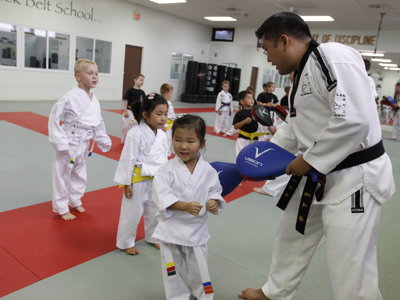Recently, Tae Kwon Do master Chan Lee, one of 200 certified bully experts in the United States, created a free anti-bullying “tool kit” for parents that features video lessons and interactive exercises. The kit is available on Chan’s website and teaches how to prevent and / or stop bullying.
Chan understands bullying on a personal level. Born in Seoul, S. Korea, his family moved to the United States in 1975. Lee grew up on 36th Street and North Avenue on Milwaukee’s North Side. As one of the only Asian families in the neighborhood, Chan and his siblings were targets of bullying.
Later, he moved to Milwaukee’s South Side, where he was again one of the only Asians, and finally, to Brookfield, where he lives with his family, including two children, today.
“I’m used to being the person that stands out because of ethnicity,” he says.
Chan’s father is J.K. Lee, a grand master of Tae Kwon Do, and the owner of five martial arts studios in the Milwaukee area. His first studio was on 36th and North but today his studios are in suburban areas. In 1997, the Korean government recognized J.K. with a special award as a top master instructor.
Chan started practicing Tae Kwon Do at the age of 5. Knowing a martial art helped him build confidence, self-control and perseverance, all of which helped him deal with bullying. He went on to be the Great Midwest Champion of Tae Kwon Do, a Wisconsin state coach and a professional coach hired by MTV for a 2008 segment of self-improvement reality television series “Made.”
“I learned a lot about reality TV,” says Chan.
Chan, who has a degree from the University of Wisconsin-Madison, runs the J.K. Lee Blackbelt Academy in Brookfield. Over the years, he trained a lot of kids whose parents brought them to the studio after a bullying incident at school.
“A lot of kids get bullied and they will come to a martial arts class to learn self defense,” he says. “And because I was bullied as a kid, I have a lot of experience with this.”
However, Chan uses the acronym “MSU” to describe the technique he once used for helping kids cope with bullying. It stands for “Make Stuff Up.” He says all of his advice was based on personal experience, and although that’s very important, there’s another side to it which only comes from reading and training.
So Chan got into a communications class at the Milwaukee County Sheriff’s office that was taught by Dr. George Thompson, an English professor turned police officer who developed the concept of “Verbal Judo.” Over the course of 27 years, Thompson trained 1 million police officers how to successfully talk to people confidently but not intimidatingly.
“Police use words as their first line of defense, so they have to know how to speak effectively to the public,” says Chan.
Chan says he attended the training a little skeptical, but by the end of it, he was a believer. He asked Thompson if he could translate his material into a program for kids, and Thompson agreed.
Chan drew parallels between Thompson’s teachings and Tae Kwon Do. For more than two years, Chan has traveled to many schools and talked to kids about how to use words effectively and, specifically, how to diffuse bullies. He also implements his anti-bullying program into his martial arts classes.
“My personal passion is help kids to be civil to each other,” he says.
He says kids of all ages benefit from this type of training, from kindergardeners to high school students.
Chan says kids need to know it’s not just what you say to someone, but how you say it. He teaches them to use eye contact and to think about body language, tone of voice and posture. Chan also role plays with kids and helps them have the words “ready to go” in case a bullying situation arises.
“I tell them, ‘you are how you respond,'” he says.
Parental involvement is integral. Role playing with kids so they know how to respond is something parents should do, according to Chan.
Chan suggests kids use humor when they can. He says a lot of bullying incidents don’t escalate when the kid being bullied is able to make a joke and walk away.
“If someone says, ‘you’re fat,’ ideally, he or she could say ‘well that’s good because I’m entering a fat contest next week,'” says Chan.
In some cases, humor doesn’t work or is not enough, in which case Chan teaches other ways to communicate, including what he calls a “polite threat.”
“Kids can deliver a ‘threat’ in a non-threatening way. They can say, ‘hey, the last thing I want is for the teacher to come over here, so can you just knock it off?'” says Chan.
Simply ignoring a bully, which is often the advice of well-meaning parents, doesn’t always work. Nor does getting up in someone’s face and responding with anger.
“The DeNiro ‘you talkin’ to me?’ approach is never a good idea,” he says.


 i evaluate to yes even if there's no image
i evaluate to yes even if there's no image  i evaluate to yes even if there's no image
i evaluate to yes even if there's no image  i evaluate to yes even if there's no image
i evaluate to yes even if there's no image  i evaluate to yes even if there's no image
i evaluate to yes even if there's no image  i evaluate to yes even if there's no image
i evaluate to yes even if there's no image  i evaluate to yes even if there's no image
i evaluate to yes even if there's no image